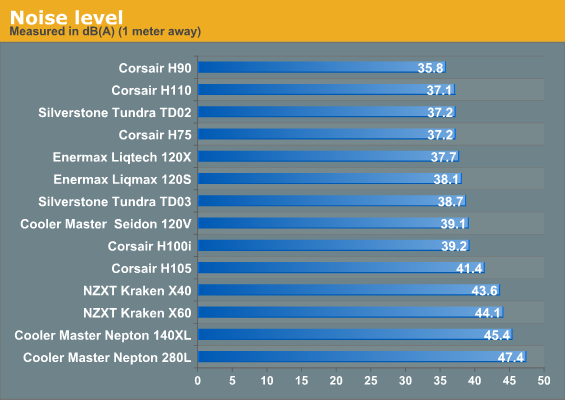Closed Loop AIO Liquid Coolers: 14-way Mega Roundup Review
by E. Fylladitakis on February 12, 2014 7:00 AM ESTTesting Results, Low Fan Speed (7V)









After dropping the voltage of the fans down to 7V, the characteristic performance of several AIO coolers changes quite a bit. As expected, the performance gap between most single and dual fan radiator models widens, as the larger surface maintains a greater heat dissipation rate as the flow rate decreases. The charts are once again led by Cooler Master's Nepton coolers, although that hardly qualifies as "low noise testing" as both coolers still generate high noise levels and are most definitely unsuitable for a low noise environment.
Corsair's H110 displays tremendous thermal performance under very heavy load, in conjunction with very low noise levels. NZXT's Kraken X60 delivers about the same thermal performance, which was to be expected as it virtually is the same design, yet the noise levels are significantly higher; apparently, Corsair chose their fans a bit more wisely (or they just got lucky). Silverstone's Tundra TD02 also fares considerably better this time, rivaling the high load thermal performance of all other 240mm coolers at considerably lower noise levels. Under low thermal loads, the Tundra TD02 manages to outperform most of the dual 120mm and 140mm coolers. Apparently, the large and thick radiator of the TD02 allows it to maintain high performance figures even when the airflow is reduced.
Those who are interested only in noiseless operation and are looking at AIO coolers as a high-performance, low noise alternative to CPU coolers should be careful with their selections. It is not always possible to reduce the speed of the stock fans or replace them in order to reduce the noise generated by the kit. For example, the fan of the Cooler Master Seidon 120V is virtually noiseless when its voltage is dropped down to 7V; the pump however is not, making a clearly audible, high pitch noise. This is also true for the Enermax Liqmax 120S, as the pump of this kit makes a whining noise as well, although the noise of its pump is significantly lower. On the other hand, the Corsair H90 is not the best performing or, due to its size, the most convenient kit of the roundup, yet it is entirely silent when its fan's voltage is reduced down to 7 Volts.










139 Comments
View All Comments
lwatcdr - Thursday, February 13, 2014 - link
And maybe the CoolerMaster Evo 212Streetwind - Wednesday, February 12, 2014 - link
Excuse me for pointing this out, but are the noise levels given here not a little bit bogus? On your "Testing Methology" page, you qualify 50-54 dB(A) as "Extremely loud (level equivalent to a ≈1500W vacuum cleaner)". Then on the next page in your 12V results, you state: "To give you a rough estimate, 56 dB(A) represents about the same level of sound as a typical box fan the same distance."Are you honestly trying to imply that a CPU fan is capable of producing a typical noise scenario that is twice as intense as a 1500W vacuum cleaner at full bore? I think that either the table under "Testing Methodology" is wrong, or you performed your tests in a way that generates results which have absolutely nothing whatsoever to do with the scale presented in the table. In both cases, said table is in dire need of a revision.
The article is very nice and no doubt took a lot of work, but with the noise levels looking as arbitrary as they do, it's very difficult to glean much value from it other than a rough order of absolute cooling performance. There's no noise floor given either, and no qualifying comparison to an air cooling solution.
E.Fyll - Wednesday, February 12, 2014 - link
That is my error. The original sentence was something along the lines of "To give you a rough estimate, 56 dB(A) represents about the same level of sound as a small vacuum cleaner over the same distance". I was then told that vacuum cleaners in the US are generally larger and much louder than their counterparts here and that the comment was edited, but I foolishly did not check the article. 56dB(A) is definitely loud, as much as two of the loudest 140 mm fans, although not as loud as a vacuum cleaner; at least not the kind of vacuum cleaners most readers here are used to. :) More like to the noise of a small hair dryer, I suppose.LancerVI - Wednesday, February 12, 2014 - link
Thanks for the explanation. When I heard "as loud as a vacuum cleaner" I was taken aback. Our vacuums are LOUD! My custom WC loop is loud, but it's no where near vacuum cleaner loud.Impulses - Thursday, February 13, 2014 - link
Now I'm intrigued by these stealthy Euro vacuum cleaners... :p3DoubleD - Thursday, February 13, 2014 - link
Me too... please review!svandamme - Tuesday, December 2, 2014 - link
take it from me , they suckConnoisseur - Wednesday, February 12, 2014 - link
It would be great to see a quiet system builder's guide with different components and form factors. My holy grail has always been a mid-upper range miniITX gaming system that's virtually silent 90% of the time. Something with a core i5 or i7 CPU and R9 270x or GTX 760 stuffed into a small case with quiet operation. Probably doesn't exist yet but one can always hope :)w1z4rd - Monday, February 17, 2014 - link
I'm running a 4770k on an Asus Maximus VI Impact with a Corsair h100i and an EVGA GTX770 in a Corsair 250D that's sitting on my desktop. Unless I'm gaming I can't hear the thing. I don't hear it when gaming either, actually, as I have a headset on.Navvie - Wednesday, February 12, 2014 - link
Ever think about asking Mike Chin at SPCR to do some noise testing for you?